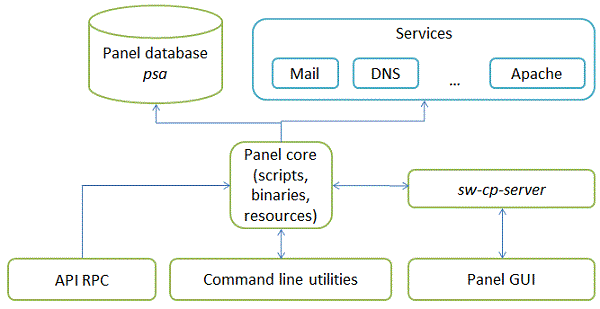Plesk files can be divided into six major groups responsible for
different aspects of Plesk work. The diagram below shows these groups
(components of Plesk) and the connections they have to each other and to
external services that Plesk manages.

Plesk components are as follows:
-
Plesk core. The core processes requests that Plesk receives from
the Plesk GUI, command line interface, and XML API. The core contains
scripts, binary files and other resources used to link Plesk
components with each other and with external services. -
Plesk database psa. The database stores information about Plesk
objects, such as IP addresses, domains, user accounts, and so on. -
sw-cp-server - a web server based on nginx. This serves requests to
the Plesk GUI.
Plesk GUI - a web interface provided with sw-cp-server. The GUI is the
main means of interaction with Plesk.
-
Command line utilities. The command line interface allows
integration of third-party software with Plesk objects. In addition,
it is a way for administrators to manage Plesk through the server
shell. For more information on the Plesk command line interface,
refer to Plesk Command Line
Reference. -
XML API. This interface is another way to integrate third-party
software with Plesk. It allows Plesk objects to be managed remotely
by sending specifically structured XML packets and receiving
responses from Plesk. For more information on XML API, refer to
Developer’s Guide: Read Me
First and XML API
Protocol Reference.
The Most Important Files and Directories
Plesk for Linux installs its main components into the following
directory:
- On RPM-based operating systems:
/usr/local/psa - On DEB-based operating systems:
/opt/psa
This directory (main Plesk directory) contains Plesk core files, command
line utilities, log files and so on.
In addition, Plesk creates files and directories outside the main
directory. The list below contains those that you are likely to use when
administering Plesk.
-
The main configuration file containing paths to utilities, services
and packages used by Plesk:/etc/psa/psa.conf -
The initialization script for opening and closing services during
server startup and shutdown procedures:/etc/init.d/psa
Initialization scripts for starting and stopping services with xinetd:
/etc/xinetd.d/smtp_psa
/etc/xinetd.d/smtps_psa
/etc/xinetd.d/poppassd_psa
/etc/xinetd.d/ftp_psa
Find more information on xinetd at http://www.xinetd.org/.
-
Plesk database:
/var/lib/mysql/psa/ -
Backup files:
/var/lib/psa/dumps/
